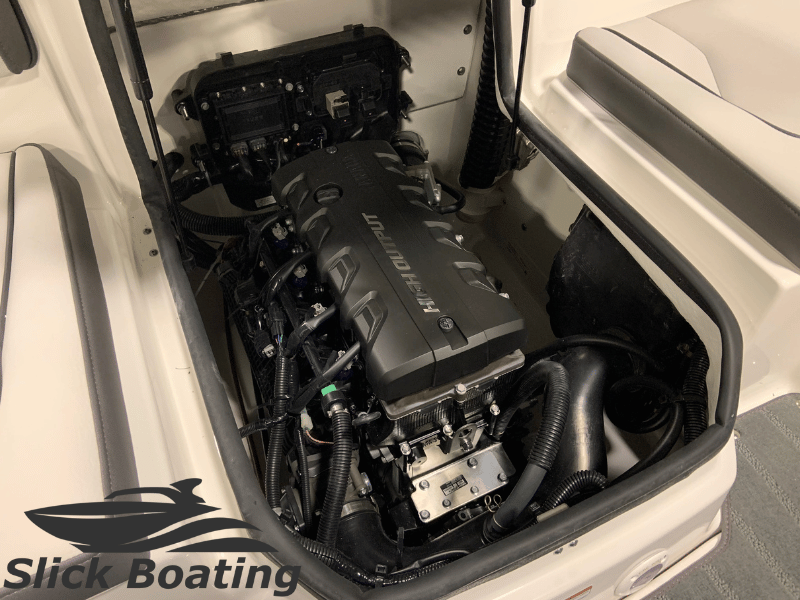Not many people know that they need to winterize their boats because they take in lake or ocean water to cool themselves.
When water freezes, it expands and since the water goes between the engine block, this can crack your engine block and other parts of your engine. Hose can bust, metal can bend and break and so much more! Freezing water is stronger than most people think and can quickly destroy your boat.
Don’t Go Below 32F For 24 Hours
A boat that is left outside in temperatures below 32F(0C) for more than 24 hours will start to freeze and run the risk of damaging your boat engine.
Your boat will be fine if the day goes above freezing, but when it gets below freezing for more than 24 hours, then you have a serious problem.
I’m a bit paranoid and winterize my boat when it gets below 40F(4C) as I’m done riding for the season and I don’t want to worry about my boat.
I also suggest the 40F temp to others who live in very windy areas, as the cold wind can find its way into your boat and freeze things before it gets to 32F outside air temp. It maybe 40F, but the windchill can be lower and freeze some things quicker than others.
Always Winterize Your Boat – No matter where you live
You should winterize every boat, or more importantly, get it ready for long-term storage. It doesn’t need to be cold for you to do proper storage procedures.
When winterizing a boat, you’re doing more than getting the water out, so it doesn’t freeze. You’re also putting stabilizer in the gas, fogging the engine, greasing parts and so much more.
Watch this video to see how to winterize a boat:
If you have a jet boat, we have a post about winterizing them here.
Will My Boat Be Fine If I Did Not Winterize It?
It happens, sometimes people forget to winterize their boats.
I highly suggest you winterize your boat, especially if it’s going to be sitting for months because if you don’t, you run the risk of something being damage at the start of the next season.
I’ve seen a few boats that did not get winterized and come out fine, but I also live in a place that rarely goes below 30F(-1C) so the odds are in my favor. Even where I live, I push winterizing hard because the few that don’t are just lucky.
If you did not winterize your boat, then you need to take a flashlight and look for any cracks on the engine and hoses. If you did not find any cracks, I would back my boat into the boat launch ramp but keep it on the trailer and run the engine while looking for any leaks. If you see no issues, then you may have come out lucky on this one.
Stored In Garage – Still Winterize It
You may have an enclosed or even a heated garage, but I still suggest winterizing your boat.
Not only are you getting the water out of the boat, but you’re doing other storage procedures because your boat will be sitting for months. Not only that, but it can still freeze in your garage, even heated ones could lose power (which it seems power outages are becoming more common).
At the very least, I would put stabilizer in your gas, spray silicone spray on metal parts, and run antifreeze through the correct ports. It’s not hard to do and cheap too!
Marine/RV Antifreeze
You can’t use any kind of antifreeze, you need marine/RV brand of antifreeze. (ad)
This antifreeze is often pink in color and safe for the environment, it’s okay it falls into the water.
Antifreeze is slippery, so if you’re doing it in your driveway, make sure to wash it away and watch where you step!
Heat Lamp – not ideal
There are several people who use a heat lamp inside their boat, but this can be tricky and not ideal.
A heat lamp doesn’t spread the heat around and puts a focus point that can burn things. When you realize boat fiberglass is very flammable, it really makes you worry about heat lamps, especially when there is a large fuel tank on boats.
Here’s a great video showing you why a heat lamp is not a good idea.
The best way is to get a heater made for boat engine compartments. A boat engine heater like this one (ad) is designed to spread the heat out and not be combustible, which is very important. You CANNOT use any heater, it needs to be one rated for boat engine compartments.
Block Heater – still do a full winterization
As stated before, winterizing your boat is more than removing the water from it.
But many people who live in tame climates often only use a boat engine heater and get away with it. I still suggest doing the full winterization no matter the temps if you’re not riding your boat for months.
When you break it down, the cost of removing water from your boat will be cheaper than the power to run a boat engine heater. With some boats, you don’t even need to do the antifreeze, you just drain the water from gravity or compressed air.
If you do go with only the boat engine heater, I suggest looking into smart temperature sensors that can alert you if your boat engine compartment gets below a certain point.
I like the YoLink Smart Outdoor Temperature Sensor (ad) because of its distance, but it does require the Hub. Once you have the Hub you can add other sensors they sell like a leak sensor or a motion sensor that can be used with your boat.
